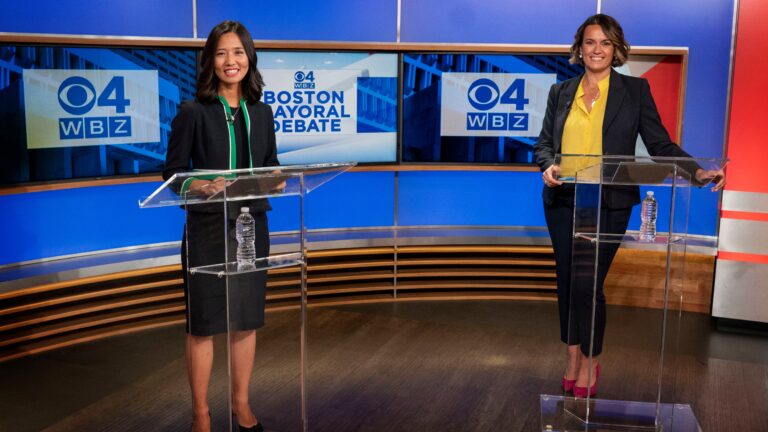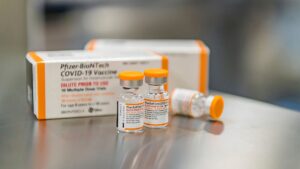Community
“We need to get to that higher vaccination rate.”
Whoever becomes mayor of Boston will undoubtedly spend the early days of their administration addressing the ongoing pandemic, including when and where to mask up — and for how long.
In Massachusetts, students in K-12 public schools will continue to require masks through at least Jan. 15, 2022, state officials announced on Tuesday. The extension will allow time for young children to receive the COVID-19 vaccine once approved.
Boston still has an indoor mask mandate that was put into place by acting Mayor Kim Janey over the summer, but some residents may be ready to see that mandate removed.
We asked Boston.com readers to submit their questions for both mayoral candidates ahead of the election on Nov. 2. Among the submissions were questions on education, public safety, and the pandemic.
One reader, James from Adams Village, wanted to know how each candidate was thinking about their pandemic response, particularly around mask requirements.
Masks help to limit the spread of COVID-19 and the CDC continues to recommend the community use of masks to prevent the transmission of the virus.
We spoke with the candidates, Annissa Essaibi George and Michelle Wu, prior to the statewide school mask mandate announcement, and asked James’ question on the goal posts they would use to bring an end to indoor masking.
Their responses addressed vaccination rates, eligibility for young children, and school mask mandates.
These responses have been edited for length and clarity.
“The current indoor mask mandate has no goal for the people of Boston to strive towards. What measurable and public metrics should the public work towards to remove the mask requirements?” — James, Adams Village
Annissa Essaibi George: Well, it’s a great question, and I’m grateful for James to ask it. It’s one that I get a lot. We certainly need to work towards greater vaccination rates, especially within our communities of color. We still see too low of a number as it relates to our communities of color. We need to get to that higher vaccination rate.
You certainly have to continue to share information, make the vaccine available, and work to build trust. I think you build trust by making sure that there are culturally competent, linguistically appropriate, community-based organizations that are actively involved in rolling out the vaccine to communities, especially those that have such a low rate of vaccination.
We’ve got to certainly make sure that we are continuing to see lower rates of infection and sickness and positivity. For me, that’s really important. And I believe that Bostonians, in particular, are working hard towards that end goal. I get that it’s difficult. I appreciate that it’s difficult. And I’m hopeful that the end is near. But for me, it’s about vaccination rates and lowering the positivity rate.
Boston.com: When you think about the vaccination rate or the positivity rate, are there any particular numbers that you think about there? Is there like an 80 percent vaccination rate or 1 percent positivity rate that you think would be the right time to roll back?
I’d say, on the vaccination rate, you know, our communities of color are at less than 50 percent of what the state is as a whole and the city is outside of our communities of color. So we need to see parity in that number. That’s really important to me.
The positivity rate I think is one that I’m a little bit more flexible on, because we’ve seen a reduction in testing across the city. That’s fine. I am cautiously optimistic that we have enough testing available. I worry about the colder months, the flu season, as we push more and more indoors. I worry about the infection rates spiking again. And so I really want to make sure that we have opportunities to put testing back online quickly. That’s important to me. But it’s really about the vaccination rate. We can drive that rate up. We’re going to see a lot of these restrictions I think come down.
The one place where I want to be clear that the masks are not coming off is in our schools, and I know that’s a topic of statewide conversation. I think, even nationally, it’s been a topic. But I’ve received that question a number of times in forums and in different discussions over the course of the race. And for me, I think that we’ve got to end that conversation. Masks will be on kids for the rest of the school year. Certainly, there are exceptions to that, when we think about our special education students when we think about some of the special needs of our students and our school community. But the mask mandate will continue for the duration of the school year.
Michelle Wu: We are still very much in a global pandemic, and need to put the safety and health of our residents and workers and families first.
So, we are watching the case counts and public health data very closely and staying in close contact with epidemiologists and experts at our healthcare institutions to make sure that we are tracking any new variants. The vaccination rates are moving in the right direction. There will be a big, big step forward when we get to the point where younger children will be eligible for the vaccine, and we’re putting in place plans to ensure that the platform of our schools and city government can help close those vaccination gaps with young people and with the booster shots as well. So it is within reach to end this pandemic, but we really need everyone to continue to stay the course in protecting yourself, your family, your community, and continue pushing to close the vaccination gaps.
Boston.com: When you look at infection rates, boosters, and vaccine access to children under the age of 12, is there a particular time that you look at? Or how do you balance those three different factors when it comes to the indoor mask mandate, school mask mandates, or any other kind of COVID rule?
Yeah, exactly. There are still some moving pieces to this, but we are getting closer and closer to herd immunity for the city and full vaccination. Boston has made some great progress, but we want to see the gaps and the disparities closed. So that will continue to be the focus for my administration in how we’re addressing the ongoing pandemic, as well as the public spaces and activities that we need to be monitoring so that we don’t see increasing spread.
Editor’s note: The election to choose the next mayor of Boston will take place Tuesday, Nov. 2, 2021. To keep track of the news of the race as it happens, follow along with Boston.com’s election live blog regularly for additional coverage of the race as the election approaches.
Newsletter Signup
Stay up to date on all the latest news from Boston.com






